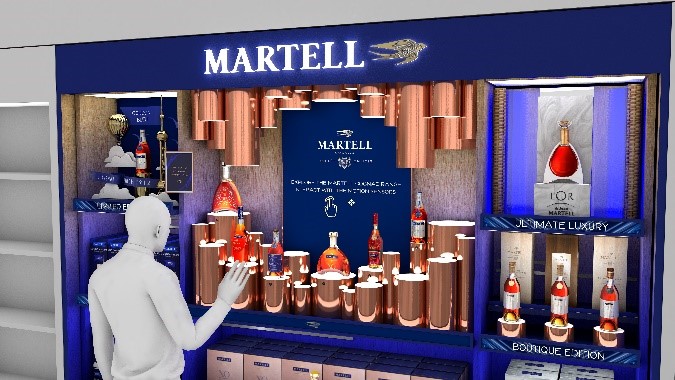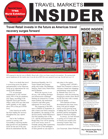Pernod Ricard GTR is using a consumer-centric approach drawing on multiple data sources to prepare for the future of travel retail amidst the global pandemic, says Anuj Roy, Strategy & Insights Director at Pernod Ricard GTR.
This observation was part of Roy’s discussion on how PR GTR is “staying ahead of the curve” at the inaugural Moodie Davitt Virtual Travel Retail Expo in October.
Roy said that by staying true to its core business model, Pernod Ricard is able to map the industry’s recovery and establish a closer connection to travelers, creating products and solutions aligned to evolving expectations.
PR GTR’s research involves over 10,000 travelers across nine nationalities worldwide and uses social media monitoring to track recovery, including monitoring the status of the virus, the levels of lockdown and mobility in the domestic market, as well as airline capacity, bookings and passenger traffic.
Despite ongoing changes to national restrictions and traveler behaviors, PR GTR remains optimistic, says Roy. “We believe in the transformational power of travel. It fulfills an intrinsic human urge to get out, connect and explore the world. International travel will rebound and with it, travel retail.”
During another panel at the Virtual Travel Retail Expo, PR GTR predicted a major transformation within the travel retail space, driven by the rapid adoption of digital during the pandemic. This panel, discussing the digitalization of travel retail and the opportunities it represents, was hosted by Pernod Ricard’s Craig Johnson, VP Marketing GTR who was joined by key industry leaders, Cameron Worth, founder of Sharp-End; Mudit Jaju, global ecommerce head at Wavemaker; and Charlie Merrells, Head of Strategy at Molzi and former head buyer BWS Amazon UK.
The panel was moderated by Doug Newhouse, retail editor at Drinks Intel.
Duty Free e-commerce rising
As a result of the pandemic, consumers are becoming more aware of e-commerce opportunities in duty free. Charlie Merrells argues that it is imperative for travel retail brands to educate consumers about online services, and make these services as accessible as possible.
“Right now, it’s important to get back to basics and offer travelers a compelling reason to purchase products within the channel. There are huge opportunities to provide convenient offers, and convenience is critical when you talk about the e-commerce journey. Education around services such as click & collect and making these transactions as frictionless as possible will be key to reaching consumers at various pick up points along the traveller journey,” said Merrells.
Pernod Ricard’s Johnson agreed: “A frictionless journey will, now more than ever, become absolutely critical. Airports are some of the most dynamic environments in the world, so the question is now: how are we going to leverage the digital experience to really add to this.”
Mudit Jaju believes e-commerce will become more omni-channel; “… We’ve already seen, particularly in some markets in Asia over the past few years, the evolution of social platforms into e-commerce channels. Facebook, Snapchat, and even Pinterest are starting to become meaningful front ends. Brands now have this unprecedented opportunity to bring themselves to life on digital platforms, and the platforms are really leaning in.”
Digital solutions to combat physical problems
The panel also addressed how to engage consumers when they are hesitant to handle product in Duty Free. PR GTR consumer data reveals that of the shoppers feeling less confident about shopping in Duty Free, 66% fear touching or picking up items that have been handled by other people. But as Johnson argued, “At some point in the future, people will want to go in-store and connect with brand ambassadors for that human inter-action again. What we’ll need to do in the meantime is add richness to products in a different way.”
Cameron Worth echoed this concept, also pointing out that “whether it’s through digitalization, by way of connected bottles for spirits, or through other unique digital touchpoints in order to provide consumers with that wealth of data, brands need to be creative in how they get consumers to engage with product once more.”
Physical experience meets online interaction
Johnson explained the need for travel retail spaces to become more engaging, and previewed upcoming store innovations including the new Martell Perfect Door. A GTR-specific feature, the Perfect Door is an experience wall that has been designed as a digital touchpoint providing travelers with an engaging brand experience. The doors are activated by motion sensors, giving travelers access to the world of Martell via product details and brand heritage, all of which can be initiated using touchless technology.
World’s first robotic airport bar in Duty Free
Johnson also revealed details around a world first for Duty Free, PR GTR’s new conceptual bar space equipped with a robot bartender. The space – which will be introduced into the channel soon — supports the group’s vision for the future of retail while addressing heightened expectations around
hygienic and contact-free tastings using an AI bartender. This is the first time a tasting robot will be used in travel retail. The space’s branding can be changed instantaneously thanks to its digital screens, removing the need to produce additional POS assets.











